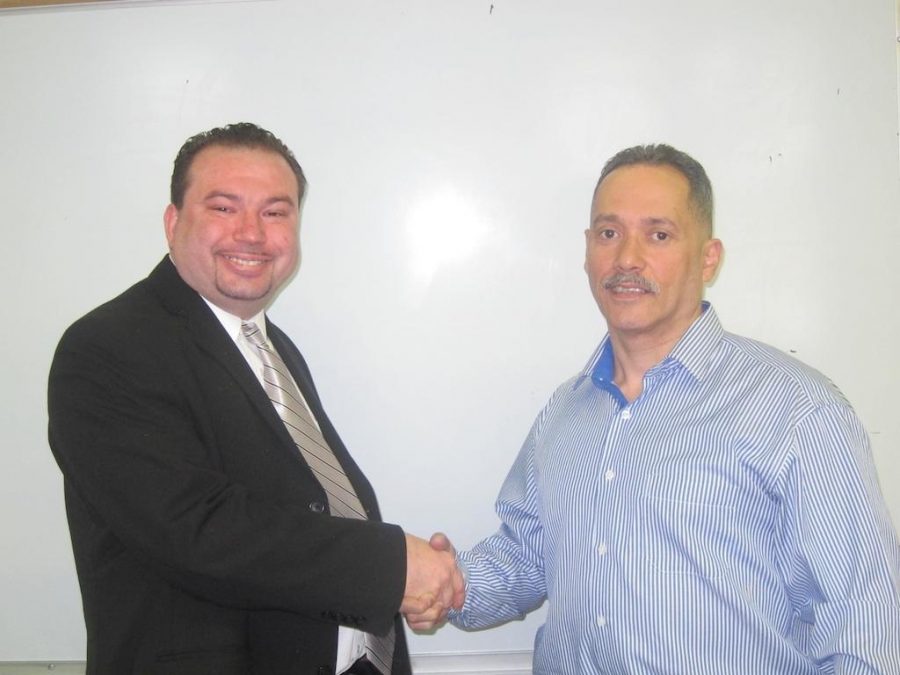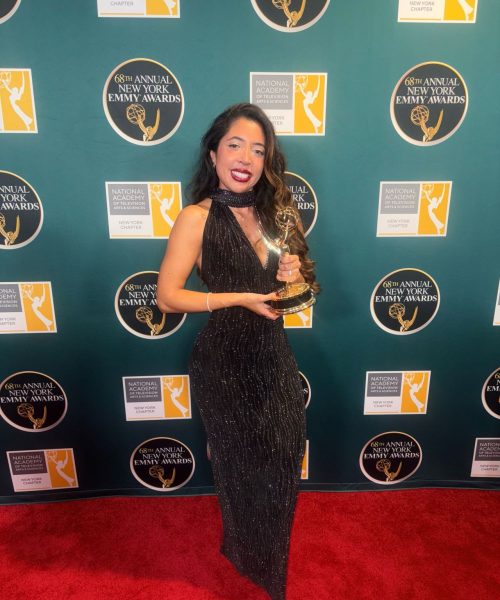Exonerated Mercy Alum Helping Others Gain Freedom
Murder suspect William Lopez spent 23 years in prison fighting to prove his innocence. Letters and appeals fell on deaf ears. Then on a cold day in January, a judge finally believed him, and said, “You are free to go.” Suddenly, after years of adjusting to the rules and accepting the unfairness of life behind bars, he could go home.
But he no longer had a home to go to. The American justice system had robbed him of more than two decades of his life, and then turned him loose. No apologies or well-wishes, not even the $40 a parolee receives for a bus ticket into town.
Any money he had was spent long ago on legal fees. His license for the well-paying union job he held before prison had expired years earlier, and his daughter, a baby when he was sent away, had grown up without him.
Jeffrey Deskovic, a Mercy College alum and founder of The Jeffrey Deskovic Foundation for Justice, was in court the day Lopez was released. Deskovic, 38, knew that Lopez faced the mighty battle of rebuilding his life and would need many things in the days to come: a place to live, medical insurance, a job. But first, a nice meal and some new clothes, so Deskovic took him to dinner, and then shopping.
“To put on real clothes was incredible. I left my old clothes in the trash receptacle at Macy’s,” said Lopez.
***
In 1989, Lopez, now 54, was convicted of fatally shooting a drug dealer in a crack house in Brighton Beach, Brooklyn. There was no forensic evidence or murder weapon at the scene, and one of the initial witnesses was later unable to identify Lopez as the gunman. The second witness had been in the middle of a two-day crack binge at the time of the murder, and also received a shorter prison sentence for her own drug charges in exchange for her testimony. She later admitted, in an affidavit, that her identification of Lopez was “pure fabrication.”
Lopez’s own attorney failed to call on key witnesses, and Lopez was sentenced to 25 years to life.
When he finally returned to court this past January, federal judge Nicholas Garaufis cited Lopez’s prosecution as “rotten from day one” because of the flimsy witness testimony, the lack of physical evidence, and the ineptitude of the legal counsel involved.
Deskovic’s foundation had been working with Lopez’s appeals team, and helped contact a long-lost witness who was integral to the judge’s ruling. Deskovic was triumphant when the good news came, but he is now connected to Lopez on a much more personal level.
For they are brothers of the same fraternity – innocent men sent to prison for long durations who were eventually set free.
***
In 1989, the same year of Lopez’s conviction, Deskovic, then 16, was convicted of the rape and murder of his 15-year-old classmate, Angela Correa. Despite the fact that the physical evidence did not link him to the crime, police coerced a false confession out of him and he went to prison for 15 years to life.
Sixteen years later, with the help of the Innocence Project, an organization dedicated to exonerating wrongfully convicted individuals, more sophisticated DNA testing led to the identification of the real murderer, and Deskovic was cleared of the crime.
Though the Innocence Project was crucial in securing his freedom, Deskovic stepped out alone into a world that had advanced without him. There was no one to help him navigate the society he had missed out on during his formative years.
“Wrongful convictions are more prevalent than people know,” said Deskovic, who stated that statistically around five percent of people in prisons are innocent, but hinted the actual number may be greater.
He was given an opportunity by Mercy College, and he wanted to repay that debt to other men who have found themselves in the same situation he was once in.
“Many people don’t have any place to turn to when they get out. That’s why I started my foundation,” said Deskovic.
Deskovic has never forgotten the help he received during the unsure months after his release. He had earned an associate degree in prison, but at 33, he thought he was too old to go back to college, so he began to earn a small living by speaking publicly and publishing articles about his wrongful imprisonment and the dangers of criminal confessions made under duress.
News of his story reached Shelley Alkin, Dean of Articulation and Outreach at Mercy College, and a full scholarship to Mercy was arranged. He completed his degree in behavioral science in 2008.
“I’m very fortunate that Dean Alkin did that. I probably never would have gone back to school if she hadn’t arranged the opportunity.”
He went on to continue his education, and is now awaiting final approval for his master’s degree from John Jay College of Criminal Justice. He also started his foundation with some of the settlement money he received for his wrongful conviction.
Lopez is his first success story.
The foundation has so far assisted Lopez with an apartment, health insurance, and a therapist to help him cope with the trauma of his experience. He often mentions Deskovic’s devotion, and the bond they both share.
“My adjustment is thanks to Jeff,” said Lopez. “We have a strong connection because of our background. We’re joined at the hip because of it.”
Deskovic wears a black suit and displays an executed demeanor of maturity, like someone who has had to deliberately act a certain way for a much of his life.
“You can easily internalize prison culture, so I had to battle that. But I didn’t want to become a physical victim either.” As a result, he had to become somewhat hardened during his 16 years in prison.
Now, Deskovic appears comfortable with himself. He talks openly and articulately about his experience and seems, maybe in a different life, like the type of guy who had the loudest laugh at a party.
But while other kids his age were falling in and out of love, mourning Kurt Cobain, and witnessing a sitting president weasel his way out of a sex scandal, Deskovic was locked up, waiting for someone to remember him, and realize that a huge mistake had been made.
He spent his first weeks in prison in shock, still convinced, despite the cage he was locked in, that only guilty people are found guilty.
“I thought I might do six months, maybe a year at most, and then this big mix up would all get straightened out.”
Instead, as he faced year after uncertain year behind bars, eating their inedible food and being watched over by uncaring prison guards, he began to visit the law library and take on his own case, learning the facts he needed to get himself out of there. For each appeal he filed, his hopes rose that it would be the one to set him free. And then denial, again and again.
He recalls the emotional roller coaster of those years.
“My arguments always seemed credible. Each time, I was on a high because I thought I would win, and the crash to earth was always pretty hard.”
After losing his seventh and final appeal, he almost gave up, but instead fought even harder.
“I waged war for my freedom for the next four years. I knew I needed my own legal team. but one that would do it for free.”
He blasted out letters to anyone who might be able to help him. He received few responses, but finally the Innocence Project took him on. By comparing the DNA found on the victim’s body to the national DNA databank, a match to the real murderer, in prison for another crime, was made.
Since his exoneration, Deskovic has won multiple lawsuits for his wrongful imprisonment. He nows possesses enough money to spend the rest of his life on a white sandy beach in the Caribbean, sipping daiquiris, and tracking his investment returns. But instead he seeded his foundation, hired a staff, and fulfilled his first dream of helping Lopez get exonerated.
When Deskovic explains his motivation, it’s clear he could never be content with a life of luxury.
“I could never forget about the people I left behind.”
Both Lopez and Deskovic are sure that there are many more innocent inmates in prison than people realize. Since the founding of The Innocence Project in 1992, more than 300 people have been exonerated by DNA testing, including a handful who were on death row.
Of course, Lopez is immediate and living proof of what Deskovic’s foundation can accomplish, though his battle is not entirely over. Charles Hynes, Brooklyn’s District Attorney, said he believes they sent the right killer to prison all those years ago, and his office is considering an appeal to the verdict that granted Lopez his freedom.
Rather than appearing bitter or angry about his lost years or his uncertain future, Lopez smiles often and speaks quietly. He tried to use his time in prison productively, tutoring inmates in GED classes, obtaining a paralegal certificate, and teaching himself a lawyer-like knowledge of the law.
It was Lopez who directed his appeals attorneys to Deskovic’s foundation, and in turn, Deskovic tracked down a witness who hadn’t been presented at the original trial.
Lopez is still living in a state of limbo until he is completely exonerated. He might go to law school, or try to find work as a paralegal, but until his freedom is guaranteed, he can’t pursue much of anything.
For now, he’s working to maintain his freedom, to make sure he doesn’t return to prison, which he described as a “zoo like setting with lots of animals, cages, and the rules of the jungle.”
When he entered prison at age 30, Lopez assumed justice would eventually prevail, but like Deskovic, found that not to be the case.
“It’s not a question of guilt or innocence. Once it reaches the trial stage it becomes a case of whether the attorneys can outwit each other.” After an arrest is made, he said, “the prosecutors only fight to prove they did the right thing, to make it seem as if everything went according to the law.”
Deskovic and Lopez are both highly literate in legalese, and they turn to the discussion of Deskovic’s case, how even though the DNA evidence found on the victim did not match his, the police cruelly coerced a confession out of him after six hours of questioning.
“The police need to have arrests,” explained Lopez. So they arrested Deskovic and “everyone was at peace again.”
And while everyone was at peace, a killer was still on the loose. While Deskovic was locked up, the real killer murdered again a few years later. He was serving time for that murder when his DNA was finally matched to the evidence found on Angela Correa.
“Most people don’t like to get involved in the justice system. What Jeff is doing is unprecedented,” said Lopez.
These days, Deskovic marvels at the fact that he runs a non-profit organization and has four people working for him. His most immediate goal, aside from helping people like Lopez reintegrate into society, is to keep his foundation running. He needs donors who believe in his cause, so he can serve others like Lopez.
Besides maintaining his freedom, an immediate goal of Lopez’s is to continue building a relationship with his daughter, which he described as “distant but getting better.”
“I started texting just to keep in touch with her. I’ve noticed that kids can text all day long, so I’m learning about that.”
As for the possibility that he will return to prison, Lopez is realistic.
“I had to accept that world as my reality for a very long time, and I know what to expect if I return, but there is still a fear of losing my freedom.”
And though he is still adjusting to a gadget obsessed world, and a New York with cameras keeping a watchful eye on every street corner, he remains optimistic.
“Overall the world has been beautiful. Life is beautiful. It’s much better than it is inside.”

Michele DeBella is a journalism major who loves to discover the interesting stories in people around the world. After more than ten years of living a nomadic...









Leesther Brown • Mar 22, 2013 at 1:00 am
Though the Innocence Project was crucial in securing his freedom, Deskovic stepped out alone into a world that had advanced without him. There was no one to help him navigate the society he had missed out on during his formative years.
I was right there for Jeff to help him navigate..#fullstomachsoonforgets….